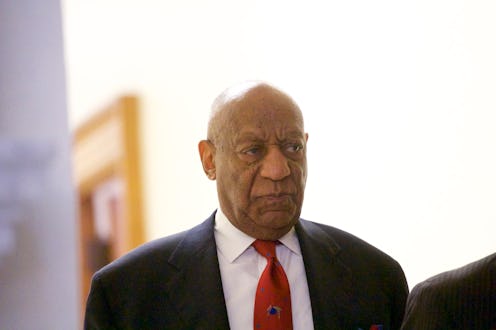News
Why It Matters That A Mostly Male Jury Found Bill Cosby Guilty

It took two criminal trials, 24 jurors, and more than 60 accusers for Bill Cosby to be brought to justice. On Thursday, after deliberating for 13 hours, a jury of seven men and five women declared Bill Cosby guilty of three counts of felony assault. The 12 jurors chose to believe Andrea Constand, who had told the court that Cosby drugged and sexually assaulted her in 2004. Most of those jurors are male. And that matters.
Why? After all, the gender breakdown — seven men, five women — was the same as the original 2017 jury pool that couldn't agree on whether Cosby was guilty. Which might lead you to think the jury's gender split played no role in Cosby being found guilty. Right?
Wrong. This year's trial took place in a different world.
Two things happened to make this trial different: First, more than one Cosby accuser was allowed to testify. Second, we're in a post-#MeToo landscape. The members of the majority-male jury were able to hear women, plural, accuse Cosby of violating them. And these men and women exist in a world where there is no longer any doubt that men take advantage of women every day, in every sphere, and are rarely brought to justice.
Earlier this month, Judge Steven T. O’Neill had asked a room of 100-plus potential jurors if they were familiar with #MeToo. Most said yes. How could they not be? #MeToo broke free of boundaries of class, race, and circumstance, teaching men once and for all that women are subject to something they can never understand. And for women, #MeToo said: You're not alone. And it was never your fault.
It has been pointed out that #MeToo did little to change the long-term factors that contribute to the objectification of women. And yet, it also set the stage for an everyday white, cis, male American to consider, even for just a moment, that women are telling the truth. That every woman deserves to be believed.
Which brings me to the second Cosby trial. This time around, Judge O'Neill agreed to let five women, rather than just one, tell the court their stories. (Why did O'Neill change his mind on this? We may never know, but analysts speculate he didn't want another hung jury). This time around, five women who were not Constand — Janice Dickinson, Heidi Thomas, Janice Baker-Kinney, Chelan Lasha, and Lise-Lotte Lublin — told the jury about their own experiences at the hands of the man dubbed "America's dad" (Cosby denies all their allegations). And the jury listened.
Is there any way to know for certain that #MeToo and the five women's testimonies were what brought Cosby to justice? No. But here's what we do know: that a cascade of survivors' testimonies were what put Larry Nassar behind bars for the rest of his life. That it was not one story, or two stories, but countless women's stories that brought down formerly all-powerful men like Harvey Weinstein.
In an emotional press conference with Gloria Allred after the verdict was read, one Cosby accuser, Lili Bernard, addressed one juror specifically. "Today, this jury has shown ... what the #MeToo movement is saying that women are worthy of being believed." She added: "When I look at this jury, there's this one young black man on the jury that I look upon as my son. And I know the disappointment that he felt in looking at a beloved black male, iconic father figure. And being able to render a guilty verdict?" She paused, then: "I thank him."
When we listen to women — and when we have been conditioned to know, instinctually, what women experience at the hands of men — we are more likely to believe them. And when we do that, it's the moment men like Harvey Weinstein and Bill Cosby stop being all-powerful.